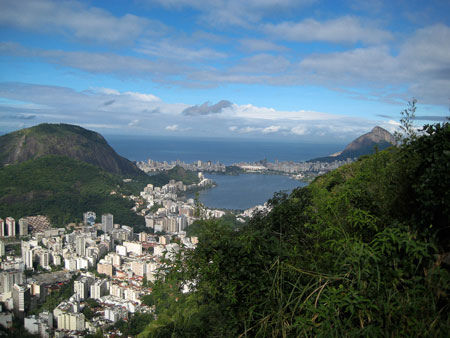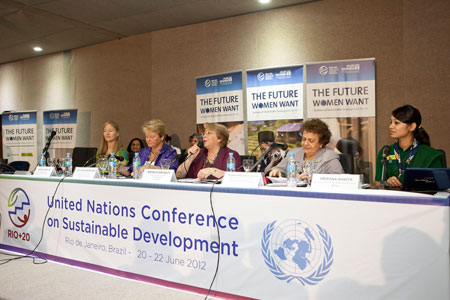
While expectations might not have been high entering the recent Rio+20 United Nations Summit on Sustainable Development, hopes certainly were. With leaders and delegates from 188 countries, including more than 100 heads of state and government, as well as thousands of representatives from non-governmental organizations (NGOs), businesses and other organizations, this was to be the next step forward for bold initiatives in human rights, sustainable development and the environment.
As Amanda noted in her post last week, forests were sadly left off the list of the major areas to discuss during official meetings and negotiations. But forests were only the tip of a rapidly melting iceberg: As the talks progressed, it became clear that nothing along the lines of the Rio Conventions on Biological Diversity, on Climate Change and to Combat Desertification that came from the original 1992 meeting would be replicated this year. The final document that emerged from Rio+20 — The Future We Want — is replete with nonbinding and modestly aspirational goals.
The parties to The Future We Want did commit to improving the conditions of people and communities around the world so that they can better sustainably manage their forests. This commitment to improvement includes strengthening the “areas of finance, trade, transfer of environmentally sound technologies, capacity-building and governance.” In other words, a lot of encouraging words, but not a lot of actual action. Lest the forest community feel alone in their soft-shoe treatment, climate change, desertification, mountains, oceans and other critically important environmental topics also received similar commitments, reiterations and reaffirmations.

Yet, while the final language of the document left many observers and participants deflated, the conference still produced action and tangible excitement. Many individuals came ready to discuss what is actually happening on the ground around the myriad of environmental challenges we face. Set apart from the main negotiations, individuals representing cities, community groups, businesses and other organizations had the opportunity to attend numerous side events covering a gamut of topics. Topics ranged widely, such as “The Protection of Lake Chad,” “Agro Ecological Farming Can Feed the World: In Practice” and “Healthy Women, Healthy Planet: Women’s Empowerment, Reproductive Health.” It is these side events that can — and maybe should — be the true legacy of Rio+20.
The 1992 Rio Convention on Climate Change has its own legion of supporters and detractors, both in and outside of the environmental movement. The convention also contained promises and encouragements, and its enforcement was the 1997 Kyoto Protocol, which required its signatories to stabilize greenhouse gas emissions. As Kyoto has shown, however, even with large-scale, binding documents, the results can be less than expected. But, the individual meetings, conversations, ideas and actions taken towards achieving the same goal — reduction of greenhouse gas emissions — often can make a more permanent impression. While protocols can be superseded, changes to individual habits and the creation of innovative technologies and their progeny can last much, much longer.
Think about your own life.
Chances are, you are not a signatory to the Kyoto Protocol, but you may be taking steps within your own day-to-day activities to stabilize or reduce your greenhouse gas emissions. Maybe you walk to the store only a few blocks away, rather than drive. Perhaps your home is composed entirely of Energy Star appliances. Or maybe when you do drive, it is a vehicle that gets more than 35 mpg. These individual actions are a recognition that no single country, business or person can limit all greenhouse gas emissions alone.
Maybe that is how we can best view the Rio+20 result: There was no grand Convention on Sustainable Development and a Green Economy (a pure hypothetical), but there are thousands of people that had a conversation with a mayor or an environmental activist or a start-up company that may lead to tangible action. Be it a removal of barriers to bringing off-grid solar power to India, more renewable energy in Brazil or a joint project for forest protection and conservation in the African Mayombe area of conservation, these projects and actions may lead to more positive results than the platitudes of The Future We Want. Their importance should not be discounted.